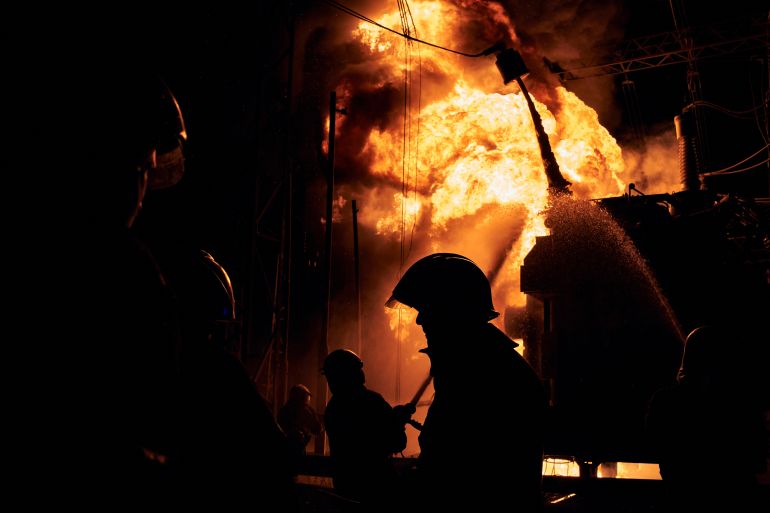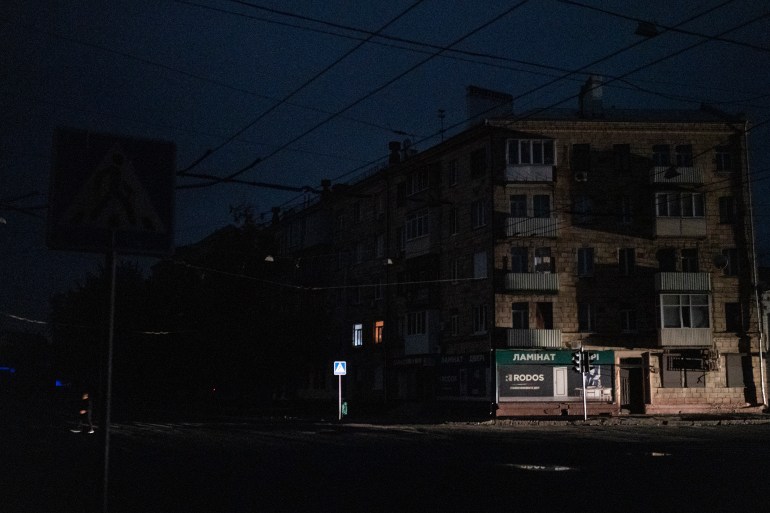Eastern Ukraine suffers blackout, Kyiv blames Russia
Volodymyr Zelenskyy accuses Moscow of deliberately hitting civilian infrastructure a day after Russian troops forced to retreat.

Ukraine’s eastern region has suffered a “total blackout” a day after a counterattack by Kyiv’s troops forced the Russian army to retreat from large tracts of the Kharkiv region, with Ukrainian President Volodymyr Zelenskyy accusing Moscow of deliberately targeting civilian infrastructure.
Ukrainian officials said water facilities and a thermal power station in Kharkiv, Ukraine’s second-biggest city, were deliberately attacked, causing power outages and cuts in water supplies.
Keep reading
list of 4 itemsZelenskyy announces breakthrough in Ukraine’s east and south
IAEA warns blackout threatens safety at Ukraine nuclear plant
Analysis: Russia caught out by Ukraine’s double offensive
“No military facilities, the goal is to deprive people of light & heat,” Zelenskyy wrote on Twitter late on Sunday, describing the Russians as “terrorists”.
As many as nine million people in the region, including in territory controlled by Russia, could be affected.
“There is no electricity or water supply in several settlements. Emergency services are working to control fires at the sites that were hit,” Oleg Synegubov, the governor of the Kharkiv region, said in a statement on social media.
Similar reports came in the evening from the regions of Sumy, Dnipropetrovsk, Poltava, Zaporizhzhia and Odesa.
‘Completely dark’
Al Jazeera’s Hoda Abdel Hamid reporting from Kharkiv said there are “power outages in five regions in the northeast and eastern part of the country. What we’re hearing from officials is that the Russians have hit critical infrastructure; they’re not telling us what or where, but this city is in pitch-black.
“We were on the streets when [the power outage] happened and as we were driving back to our location, everything was completely dark; there was not one light on. It was quite an eerie scene.”
Officials in the Sumy, Dnipropetrovsk and Poltava regions said shortly after the electricity cut announcements that power had been restored.
The Russian attacks were also disrupting railways, with the national train service announcing delays throughout the east including in Kharkiv.
Ukraine’s foreign ministry spokesman Oleg Nikolenko said the Russian attacks were an “act of desperation following Russia’s immense losses and retreat in eastern Ukraine.”
The Russian raids hit 15 locations on Sunday, from Kramatorsk in the east to Mykolaiv in the south and Dnieper in between, Ukraine’s military said.
The US ambassador to Ukraine, Bridget Brink, joined Ukrainian officials in condemning the attacks.
“Russia’s apparent response to Ukraine liberating cities and villages in the east: sending missiles to attempt to destroy critical civilian infrastructure,” Brink tweeted.
Moscow denies its forces deliberately target civilians.
‘A strategic victory for Ukraine’
The blackout came after Ukrainian forces said they had recaptured dozens of towns and villages in eastern Ukraine and forced Russian troops into retreat on Saturday.

The Ukrainian president on Sunday hailed his troops for their advance. Earlier, the head of the Ukrainian military announced that as much as 3,000 square kilometres (1,158 square miles) had been wrested from Russia since the offensive began at the beginning of this month.
Zelenskyy thanked Ukrainian forces who “liberated hundreds of our cities and villages … and most recently Balakliia, Izyum and Kupiansk,” naming three important hubs recently captured by Kyiv.
The pullback marks the biggest battlefield success for Kyiv’s forces since they thwarted Russia’s attempt to seize the capital Kyiv at the start of the war.
The reaction in Moscow to the Ukrainian gains so far has been muted, but on Sunday a military map presented by the Russian defence ministry showed that its forces had made a significant withdrawal from the Kharkiv region.
Russia controlled just a sliver of territory in the region’s east, behind the Oskil river, the revised map showed.
On Saturday, Moscow announced it was “regrouping” its forces from Kharkiv to the Donetsk region to focus its military efforts there. Thousands of Russian soldiers left behind ammunition and equipment as they fled Izyum, which they had used as a logistics hub.
Chechen leader Ramzan Kadyrov, an ally of Russian President Vladimir Putin, on Sunday, criticised the Russian army’s performance.
Zelenskyy hailed the offensive as a potential breakthrough in the six-month-old war and said the winter could see further territorial gains if Kyiv received more powerful weapons.
Foreign Minister Dmytro Kuleba echoed the call.
“Weapons, weapons, weapons have been on our agenda since spring. I am grateful to partners who have answered our call: Ukraine’s battlefield successes are our shared ones,” he said on social media.
“Prompt supplies bring victory and peace closer.”
Observers have said that Ukraine’s strategic gains in the east have provided an “unwavering” international community with evidence of its forces’ capabilities.
“This is a strategic victory for Ukraine – of far greater significance than the defeat of the Russians in Kyiv in March,” Frank Ledwidge, an expert in military capabilities and strategy at the University of Portsmouth, told Al Jazeera.
He said the counteroffensive showed the Ukrainians had the ability to impose losses on the Russians.
“But it’s also a demonstration of their skills and combined arms warfare, and bringing the gear and training they’ve had over the last few months all together to take back an area of land that’s far greater than the Russians have taken since April.”
“It’s very significant and it demonstrates the Ukrainians’ capability with deception,” he added. “It’s an intelligence coup and it’s a remarkable display of Russian ineptitude, particularly in the intelligence realm.”